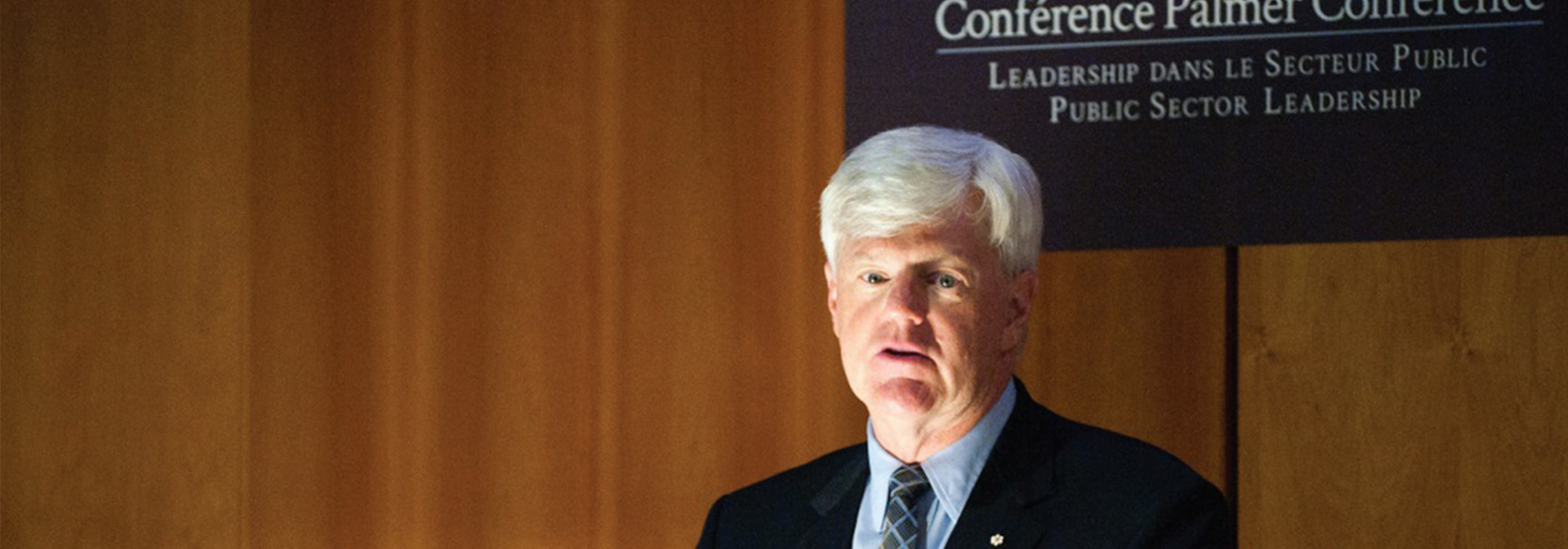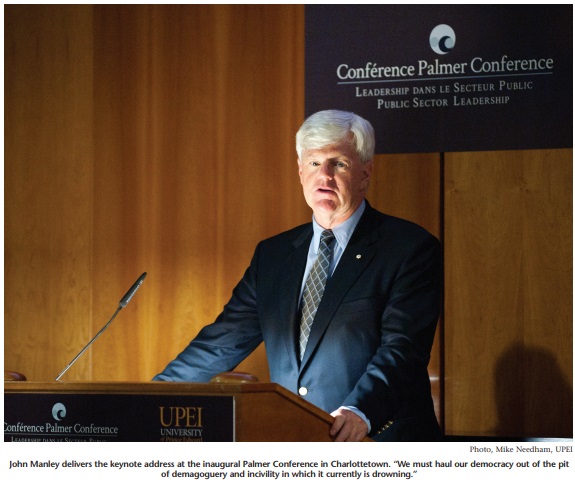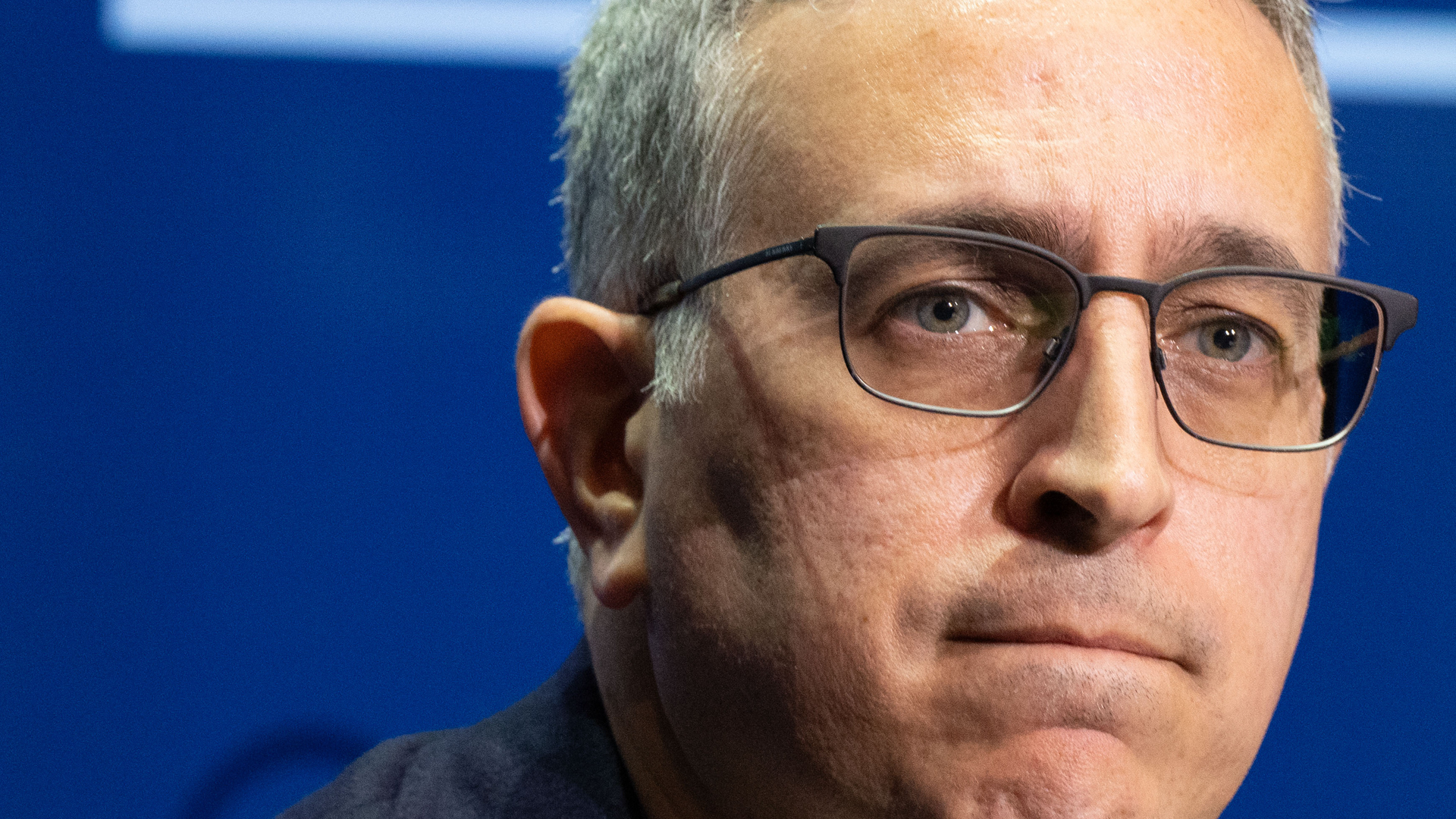
When I talk with other “formers” from the political world, not just in Canada but elsewhere as well, about what we miss and don’t miss from our past lives, we invariably agree that we do not miss the media.
That said, many miss the opportunity to be seen and heard in the media. The complex symbiosis that exists between politicians, their officials and the media is little understood and infrequently considered, but it truly lies at the heart of our democracy.
Government is how we organize our society to meet our basic and sometimes our advanced needs. Politics is how we sort out and choose those who will govern us. The media are our main tools for discussing both across our communities.
What is written and what is said through the media create the perceptions that lead to judgments in the democratic marketplace.
So nothing is more integral to our system of democratic government than the relationships among professional public servants, politicians and the media.
Most prime ministers (at least the ones that I have known) seem to have in common a disdain for the media that belies their fascination with the content of the daily news.
And to complete the picture, no public servant, wishing to serve his minister well, could fail to be media-savvy. Which is why, in true Yes, Minister tradition, I quickly learned that if my officials told me that a decision would be seen as courageous, they meant that I was very close to the edge of the cliff.
I have a rather gloomy thesis to present to you.
I first sought political office in 1988. It would be my contention that the issues facing policy-makers today are much more complex, globally significant and interrelated than when I first entered public life.
At the same time the factors that deter capable individuals from pursuing a career in politics or the public service are more daunting and difficult to overcome. This is not a formula for success!
I would insult you if I were to waste time making the case that this has been a period of rapid and profound change. I take as self-evident that the last two decades have seen multiple shifts of some of the paradigms that shaped Western civilization over several centuries.
What I ask myself is whether we have developed the culture and structures of governance that are necessary to manage this change so as to protect Canadians and enable us to continue to prosper.
We face an urgent need to renew our politics. Today’s pace of change demands that we be ready to adapt and innovate in a thoughtful manner. To do this, we must haul our democracy out of the pit of demagoguery and incivility in which it currently is drowning.
To begin this process, we need to ask ourselves some tough questions about the public sector leadership our country needs. For instance:
The role of government and the public service: What is the boundary between the responsibility of the state for the public good and personal freedom and responsibility?
The kind of politics and the conduct that may be required of our leaders in these changing times: Is there a time and place for determined partisanship? When is it appropriate to negotiate and compromise and with whom?
The changed vocabulary and focus required of public sector leadership and the media: How do we reflect the more diverse and complex society we now have? How can we make better use of the tools of communication that technology has put at our disposal?
Managing risk in a volatile and competitive world: How do we find the right balance, in our public institutions as well as our business enterprises, between prudence and caution aimed at avoiding failure and the initiative and entrepreneurship that are essential to sustain and increase our prosperity?
These are complex questions. They cannot be addressed, much less resolved, around an individual kitchen table, at a conference like this or in a single televised political debate. Rather, we must, as a society, think carefully and talk seriously about the outcomes we want — and about how we might get there from here.
My generation gained its political awareness in the 1960s in an era in which government had great ambitions, and in which being politically engaged was something we just did!
It was the time of John F. Kennedy’s New Frontier, of Lyndon Johnson’s Great Society, of Pierre Trudeau’s Just Society.
It was a time of activism and engagement, of the Peace Corps, the civil rights movement and protesting the war in Vietnam. Canadians were all about peace, order and good government, unlike our ruggedly individualistic southern neighbours, who were vigorous in their pursuit of life, liberty and happiness.
We were less wary of the state than they. We were, generally, deferential to authority, comfortable with activist government and had a strong sense of community.
But I sometimes compare my experience of the ‘60s with that of my own children in the ‘90s. The ‘60s were years of great accomplishments, the formative years of the welfare state, including medicare and the Canada Pension Plan. It was when we adopted our wonderful and distinctive flag. It was the time of Expo 67. It was when we truly believed that government could define the great objectives of the nation, and then move forward with vigorous determination to achieve them.
It was a time when anything seemed possible, when even the Maple Leafs could win the Stanley Cup!
A few decades later, many young Canadians no longer look to their governments with such confidence, nor do they look to the future with such optimism.
We face an urgent need to renew our politics. Today’s pace of change demands that we be ready to adapt and innovate in a thoughtful manner. To do this, we must haul our democracy out of the pit of demagoguery and incivility in which it currently is drowning.
I am very proud to have served in the government of Prime Minister Chrétien, and I believe we provided sound, practical government to the country over 10 years.
And we did many good things including the National Child Benefit, maternity leave and palliative care, investments in universities, research, science and technology — the “innovation agenda.”
But I think if you were to ask my prime minister about the things of which he is most proud in his administration, he might mention three things:
- Conquering the towering deficits left to us by the governments that preceded us.
- The Clarity Act, which has set some legal and procedural obstacles in the way of Quebec separatists (or those of other provinces, for that matter).
- The decision not to follow George W. Bush and Tony Blair into war in Iraq.
Make no mistake, these were all very important matters, and the former prime minister is right to be proud of them, but do those three signature accomplishments inspire a generation to pursue public service as the highest calling?
To conquer the deficit, we reduced expectations and brought appetites into line with the nation’s capacity to meet and satisfy them. This meant challenging the entitlement expectations of many, which was good, but it also meant ratcheting back ambition.
We cut spending and we raised taxes. Both were necessary to put an end to many years of deficit financing.
In the Clarity Act, we wrote sensible ground rules for breaking up the country — rules that have gained purchase internationally. (I’m thinking of Montenegro.) Solid, pragmatic, prudent, but more a shield than a sword.
And in not associating ourselves with the folly of the invasion of Iraq, we were wise, maybe even visionary, but not doing something is hardly a sign of great purpose.
So, Canada has at least one generation which has grown up as their government has been reducing its presence. Not surprisingly, Canadians are less sure today that government is relevant to their needs and aspirations.
However, many of the changes in political culture that have emerged are healthy ones:
- Canadians do not want their governments to spend more than they can afford.
- We learned that growth is not inevitable and that we must have the right mix of public policy and private investment if we want a strong economy.
- We realized that we must take more responsibility as individuals for our families, our health and retirement as well as for our communities.
- We are more demanding of results and high ethical conduct from our public officials.
But surely this could have been achieved without Canadians hearing over and over again, mainly from politicians who sought power for themselves, that government is inefficient at best and corrupt at worst, that government was the problem rather than a solution.
The word “corruption” has to be the most debased word in Canadian political discourse. I’ve spent some time studying Afghanistan and from that perspective, I sometimes wonder if Canadians even know the meaning of the word “corruption.”
In post-Gomery Ottawa, a public service manager has less to fear from failing to achieve his or her departmental objectives than from an unsatisfactory internal audit that uncovers a trivial amount of “waste.” Instead of a culture of accountability, in which finding a problem and solving it is to be praised, we have developed a culture of name, blame and shame.
But in post-Gomery Ottawa, a public service manager has less to fear from failing to achieve his or her departmental objectives than from an unsatisfactory internal audit that uncovers a trivial amount of “waste.” Instead of a culture of accountability, in which finding a problem and solving it is to be praised, we have developed a culture of name, blame and shame.
Thus, many public servants and politicians are fleeing risk — the very risks that are necessary to drive innovation and growth. And in seeking to avoid risk, they are, ironically, reinforcing the argument that government is indeed irrelevant.
The result is an erosion of public space, a decline in the importance we attach to
collective action and a growing mistrust of the state. All of these are dangerous if left unchecked.
Why? Because public policy matters. Surely this is lesson number one of the credit crisis and the ensuing recession.
At a time when technology is redefining “community,” we cannot forget that real (as opposed to virtual) communities must still function well in the interests of our health, safety and security.
As we witness the development of Web-based communities, we need to remind ourselves that these will not substitute for flesh-and-blood human communities. But perhaps they can be exploited to strengthen community building in real space.
I believe we must also renew our politics and adapt our political institutions if we are to meet the challenges the modern world is throwing at us. And we must attract our best and brightest to the world of public affairs and public policy if we are to face today’s challenges adequately.
I suspect everyone will have his or her own list of these challenges. My top 10 — some Canadian and some global — (with apologies to David Letterman) are these:
- The risk of cyber-attack and its potential to imperil public infrastructure, compromise national security and disrupt the flow of trade and commerce.
- The shift of power from the federal government to the provinces, which makes the achievement of coherent policy development across the federation difficult if not impossible.
- Urban challenges, especially poverty, as most of the population lives in cities that are feeling the strain of aging infrastructure, crime and governance difficulties aggravated by inadequate sources of revenue.
- Threats to peace and security, including nuclear proliferation, terrorism and criminality emerging from dysfunctional states and non-state actors, from al-Qaeda to pirates and criminal organizations.
- The unfinished mission in Afghanistan, where we have invested more blood and treasure than in any other conflict since Korea, where we continue our largest overseas development assistance commitment and where the neighbourhood is one of the most unstable and dangerous on the planet.
- Canada’s role more broadly in a world in which global power is shifting, as the emerging economies of China and India in particular become ever more important and as trading patterns change.
- Demographics, as an aging population puts increased stress on our workforce, pensions and health care systems in Canada while global overpopulation strains the world’s resources and environment.
- The United States, always important to Canada, presents an often changing set of challenges to Canada, as we face new security issues at the border and resurgent protectionism. Even more worrisome is the inability of the US political system to build consensus on important but difficult issues at a time when its influence and economic leadership are desperately needed in the world.
- Public finances in the developed world, including in Canada, where our federal government has its largest deficit ever and our provincial governments are again deep into the red. Sovereign finances around the world are creating uncertainty and the massive fiscal deficits being accumulated in the United States are unsustainable.
- Climate change, and its effect on food production and water resources, not to mention the drastic effects of increasingly ferocious weather-related events.
I’m not sure I want to argue the order of these, and there are others, of course, but my point is simply this: there are a lot of overwhelmingly important public policy issues on this list.
We surely will fail to resolve complex issues of public policy if the ways we do politics and implement public policy generate an ever-increasing spiral of cynicism that keeps our best minds focused on private matters.
I believe, first, that we need a new approach to politics.
Political parties play an important role in our democracies by providing voters with choice, but partisanship that cannot compromise, that demonizes adversaries and that relies on vicious ad hominem attacks degrades our democracy.
Increasingly, smart, sensible people who should be thinking of fulfilling a public role, either elected or nonelected, choose not to subject themselves to the poisonous atmospherics of public life, partisan self-righteousness and “gotcha” journalism.
Citizens surely know that no political party has a monopoly on wisdom or, even less, on virtue. They know that what they need is leadership that emphasizes collaboration and constructive resolution of our difficulties.
We need to reverse the current poisonous trend and create a more positive dynamic within the political life of our country.
Second, our institutions of government need to be fortified and renewed. This will largely be the legacy of our public servants, whose trusteeship of the institutions of government is real and vital.
I believe we must also renew our politics and adapt our political institutions if we are to meet the challenges the modern world is throwing at us. And we must attract our best and brightest to the world of public affairs and public policy if we are to face today’s challenges adequately.
It is rare that we see a senior public servant resign his or her post on a matter of principle. But when it happens, it is a matter of grave significance.
Our public servants must be forthright in their advice to ministers, tireless in fulfilling their directions, but diligent to ensure that the institutions remain able to provide the same fact-based analysis and advice to the next government and the one after that, regardless of political party.
To survive and flourish, Canada needs leadership in our public institutions that can link our human resources and physical infrastructure with international networks, and that is able to respond to opportunity and risk everywhere on the globe.
We need governments able to deal effectively with global threats to our health and to our security, from pandemics to terrorism.
We need governments capable of investing intelligently in education and skills development and managing immigration policy in an era in which the central policy challenge is shifting from creating jobs to finding enough skilled people to do the work that needs doing. We need governments that are prepared to lead on energy and climate change, shaping new tools to protect the planet while intelligently protecting our national interests.
These are enormous challenges, and for these we need a new and better approach to politics than we have been witnessing. I have even called it a “new politics.”
A new politics knows that we cannot find solutions to ever more complicated problems in our silos; that we need to look outside and to understand the permeability of the borders that have in the past divided and limited us.
In this, Canada’s history of openness to the world is an important competitive advantage. Multiculturalism, multilateralism, multidisciplinary research, private-public partnership — this is the future.
This is the future. And this will define the new politics and new skill requirements of those who shape the public policy of the future.
It is not at all clear how we stop the negative spiral we are in and bring a new politics and renewed institutions into being. But each individual can make a contribution:
- Citizens, in democracies at least, can insist upon being treated like intelligent human beings who care about their communities and their country and demand a more mature debate about issues that matter.
- Politicians, by backing away from the personal attacks and talking about complex matters in a serious manner — telling the truth about some of the hard choices that face us.
- Journalists (and their editors), by treating politics and public policy as something more than entertainment.
- Public servants, by remaining faithful to their duty to provide clear, analysis-based advice to their political masters, standing on principle when necessary to protect and preserve the institutions and maintaining the capacity to provide policy advice and execution for future as well as current governments.
Citizens in a democracy over the long term get the government they deserve. If we are going to deserve the government we need, then we need a broad effort to restore public respect for our institutions and the people who offer to serve in them. We can and must do better.
Forget the weekly scorecard about who’s up and who’s down.
Reward thoughtful debate with positive coverage. Applaud compromise when it is called for as strength rather than ridicule it as weakness — but equally, respect the courage of leaders who are willing to make unpopular choices for the good of the country.
Ask the difficult questions, but with a tone of civility that recognizes that they are difficult, and that the simple, elegant solutions to complex problems are frequently wrong.
I could, and perhaps should, stop there. But I do wish to ask you to think about the impact of technology for a further brief moment.
Now, in my public career I became known as something of a technophile — an early adopter of computers and BlackBerrys. When I tried to explain the digital revolution in cabinet in 1994, I was met with much rolling of eyes.
Of course, the internet has become an important part of all of our lives. But I think we are at another inflection point, as the Web 2.0 phenomena become mainstream.
Facebook, YouTube, Twitter, LinkedIn: these tools of social networking have demonstrated their ability to reach and inspire millions of people. In the United States, they brought a whole new generation of Americans into the political process, many of them catching the “Obama fever” that proved decisive in the 2008 presidential election.
Throughout my 16-year career in politics, I knew that my communications staff would go to sleep every night worrying about what the morning papers would report on. In other words, how had I stuck my foot in my mouth this time?
At 4 a.m. newspapers defined the news cycle of the day; the broadcast outlets would pick up on the story and then the chase to get the sound bite was on for the rest of the day.
Politicians were reliant on the media to get their messages out.
That much remains true today, and while the proliferation of new media has brought many new voices to the arena of public policy debate, it also creates new challenges. The fragmentation of audiences is eviscerating profits and newsroom budgets among the mainstream media.
That squeeze on resources, together with the relentless speed with which new media blurt out their chaotic blend of fact and opinion, leaves mainstream reporters and editors without the luxury of crosschecking sources and making sure they have all the facts before they publish or broadcast.
This leaves me seeking a “gold standard” for reliable reporting. Rather than people believing anything they hear, I suspect that they will soon believe nothing they hear.
I believe there is a market for a news source that is known to be reliable and firmly based on fact rather than opinion. I am afraid I distressed an American friend by telling him that I was more confident of information from the Al Jazeera English network than I was of Fox News.
I believe that ultimately, credibility remains the key to success in the media business. The technologies that are transforming media also are creating new tools for politicians, freeing them from their old reliance on the mainstream media. These new tools have one element that is priceless when delivering political messages: control.
Furthermore, the Internet is not just information being “pushed” out. It is a two-way street that enables politicians to engage as well as to inform voters.
One of the biggest challenges in my political campaigns was that of mobilizing the grassroots.
There is a market for a news source that is known to be reliable and firmly based on fact rather than opinion. I am afraid I distressed an American friend by telling him that I was more confident of information from the Al Jazeera English network than I was of Fox News.
That, together with fundraising, was done through meetings in church basements, dinners, personal phone calls to supporters and direct “snail” mail campaigns.
Today, while those are still important, you can reach thousands of people simply with a click of a mouse. You can start a page on
Facebook and encourage people to join your community.
And as we all know, Obama was extremely successful at generating funds from the grassroots through his Website. That’s an enormous benefit for a candidate. He or she can spend less time at rubber-chicken dinners, fewer soul-sapping hours begging for cash on the phone, less time schmoozing possibly questionable characters and more time honing speeches, working on policy, engaging the media.
It’s a new form of politics; it will last beyond Obama and will change the shape of all campaigns to come.
This technology of inclusion has made activists of people who had never before been engaged in politics and who, despite their enthusiasm for the candidate, would have been unlikely to find their way into a traditional campaign headquarters to volunteer.
But the challenge for those involved in public policy is to apply the lessons learned from this political campaign experience to the day-to-day task of governing.
We surely have learned something about the polity which we seek to govern. It is not content with a “we/they” or “insider/outsider” paradigm.
The momentum is in favour of consultation, inclusion, collaboration.
As our population becomes more familiar with the tools of Web 2.0, government will no longer be able to make policy in a vacuum, or by consulting elites and interest groups.
More and more, ordinary citizens will demand to be included in the process of policy development.
And as we recruit more Web-comfortable young talent to the public service, they will be mystified if we continue policy development within departmental silos, without adequate collaboration.
The challenge then becomes how to encourage policy entrepreneurship — innovation and risk-taking — without becoming so constrained by consultation and consensus building that nothing gets done.
We also must ensure that the ease with which citizens can become engaged does not lead to a lowest-common-denominator approach to policy-making.
I am deeply worried that we will find one day that the influencers are anonymous and ill-informed, and the decision-makers are cautious and intimidated.
This need not be the outcome, but we need to get working now if we want to avoid that future.
Will we as a society and our institutions rise to the challenges that our times have thrown at us? I hope so. But I also believe so.
The task of governing was never more important, and thus the satisfaction of making a difference has never been greater.
Excerpted from the opening keynote address to the inaugural Palmer Conference at the University of Prince Edward Island, Charlottetown, August 26, 2010.
Photo: Mike Needham, UPEI








